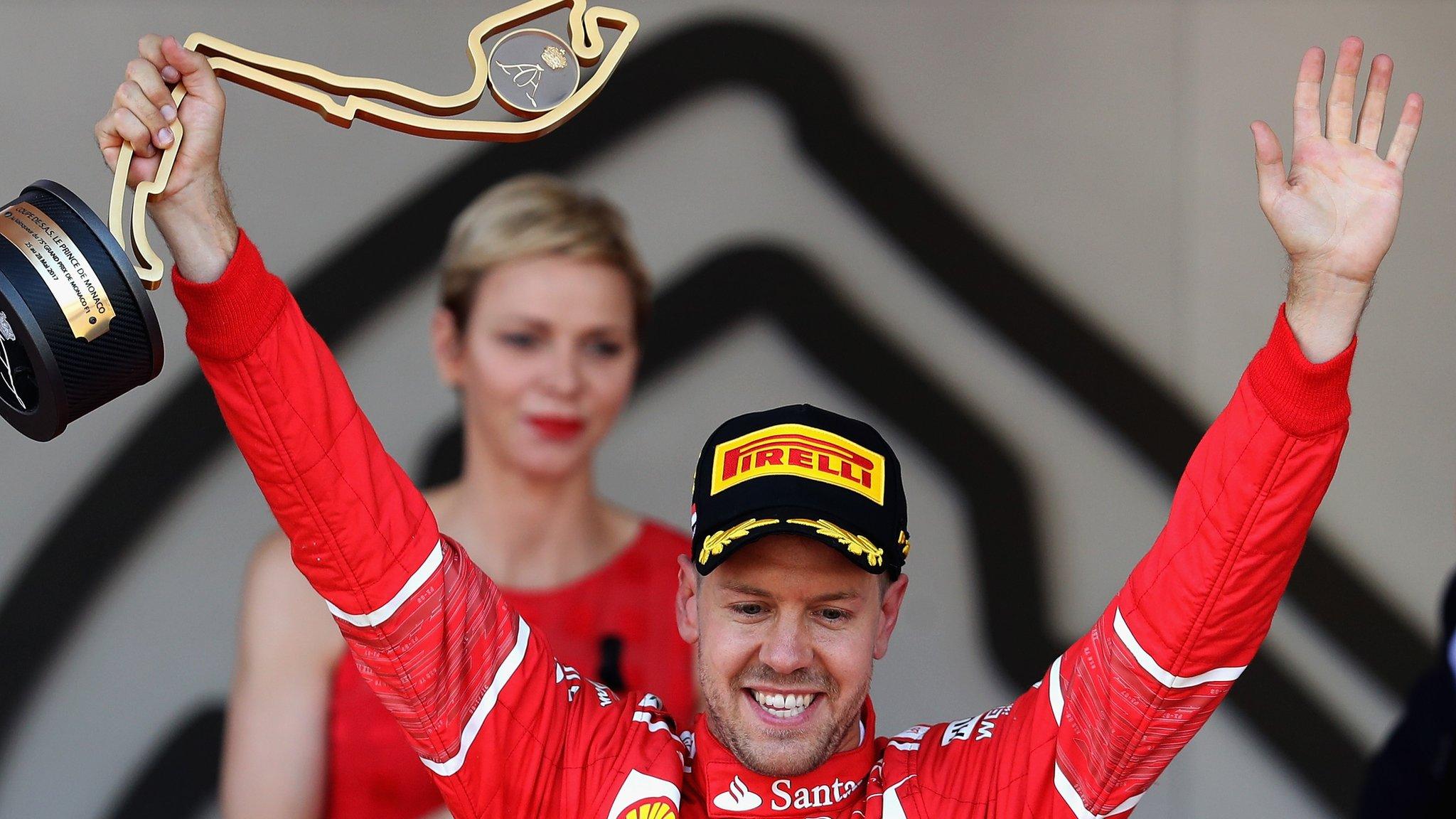Monaco Grand Prix: Team orders or not Mercedes have their own problems
- Published
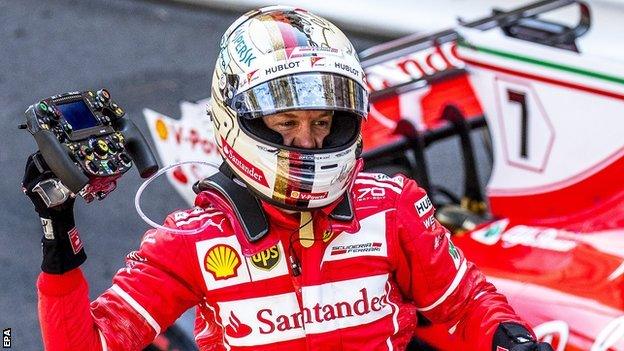
Sebastian Vettel has won three of this year's six races - and came second in the other three
If a week is a long time in politics, as events in the UK and the US are proving right now, two is certainly enough time to change the complexion of a Formula 1 world championship.
A fortnight ago in Spain, Mercedes' Lewis Hamilton was on a high following a brilliant win in which he had caught and passed title rival Sebastian Vettel's Ferrari.
Monaco on Sunday told a very different story, as the latest chapter of one of the most closely contested Formula 1 seasons in years unfolds chapter by chapter in intriguing fashion.
Mercedes struggled all weekend at Formula 1's picture-postcard, blue riband venue, encountering similar problems to those they suffered in Russia two races ago in finding it difficult to make their tyres work effectively.
And Hamilton struggled more than team-mate Valtteri Bottas, qualifying 13th after a series of errors before limiting the damage to his title hopes as much as possible with a seventh place in the race.
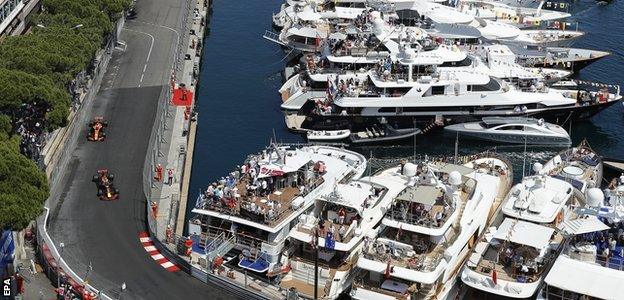
Ferrari won at Monaco for the first time in 16 years
Meanwhile, the scale of the challenge facing Hamilton and Mercedes snapped into clearer focus. Not only did Ferrari confirm yet again they have a car that is easy to work with and that is fast on every type of circuit, but the team underlined their commitment to Vettel as their leader with what many interpreted as a race manipulated to get him ahead of team-mate Kimi Raikkonen.
Hamilton, for one, was certainly convinced.
"It is clear Ferrari have chosen their number one driver and are pushing everything to make sure Sebastian will maximise his points," he said. "The leading car… it is very hard for him to get jumped unless the team decide to favour the other car."
Ferrari's controversial strategy
Ferrari denied after the race that they had deliberately orchestrated the race strategy to favour Vettel. That was the impression many formed during the race, though.
In fact, it was the talk of the paddock before the race even started. Many in F1 believe Vettel has number-one status guaranteed in his contract at Ferrari, and there was considerable discussion in Monaco on race morning as to whether the team would find a way to remove Raikkonen from his path.
On Saturday, the Finn took his first pole position for nine years, while Vettel made mistakes on both his runs in final qualifying and ended up second by just 0.043secs.
It created a quandary for Ferrari. It meant that, in normal circumstances, as long as he got away well from pole, the win was pretty much in the bag for Raikkonen.
Normal practice for F1 teams is to give the lead driver preference on strategy, so in theory Raikkonen would get priority at the pit stops and win.
'I don't make enough money to live Monaco!'
But teams can run their races as they please, 'team orders' or tactics are permitted in F1, and Ferrari are one of the teams who traditionally use them most.
A win for Raikkonen would have been his first since the 2013 Australian Grand Prix, and his first since returning to Ferrari in 2014, since when he has generally had a difficult time against first Fernando Alonso, and now Vettel.
But it would have reduced by seven points Vettel's tally, and in a season as close as this against a rival as formidable as Hamilton and Mercedes, it would be hard to give that up. Mercedes, after all, have already ordered Bottas out of Hamilton's way in Bahrain this season and employed him strategically against Vettel in Spain.
So people were looking for evidence that this would happen, and there was plenty of it.
Raikkonen stopped on what Ferrari said was to plan on lap 34. But he came out into traffic. Meanwhile, Vettel was left out and put in five blistering laps before his stop, from which he emerged in the lead.
Ferrari had an explanation. Was it deliberate? "No way," they said. "There was no plan whatsoever to get Seb ahead."
Why was Raikkonen stopped when he would come out in traffic, when there was no need to stop then? It was the plan, Ferrari said, and, whenever you stop in Monaco, you'll get traffic eventually.
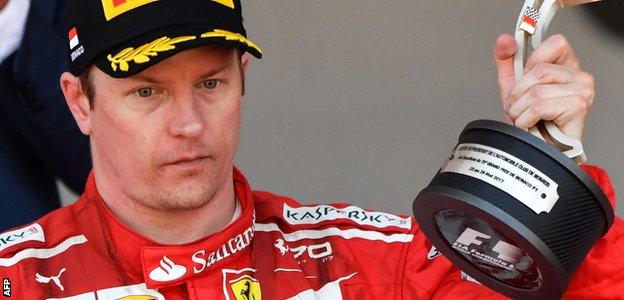
It's hard to tell - Raikkonen could have just won the World Championship
The problem with that is a team would not normally choose to pit a race leader when he was going to come out behind back markers. It was the key moment, and it hampered Raikkonen's attempt to defend his position.
They needed to pit Raikkonen, Vettel said, because Hamilton's team-mate Valtteri Bottas had stopped and they were protecting against him - except Mercedes were not attacking Ferrari but defending Bottas against him being passed by Red Bull's Max Verstappen, who had stopped on lap 32.
Ferrari left Vettel out, they said, because Red Bull had done the same with Daniel Ricciardo and needed to protect Vettel against being 'over-cut' by him (in the same way Vettel was doing to Raikkonen).
The problem with that was that Ricciardo was racing team-mate Verstappen and Bottas, and not the Ferraris.
There is, of course, no way to prove one way or the other that Ferrari created an opportunity for Vettel to take the lead.
At face value, their explanation is logical - the Red Bulls and Bottas were not that far behind and Ferrari had to be aware of the risk they created, however small. And they insist that their internal rules are that the drivers are free to race - as long as they do not do anything stupid and until the mathematics of the championship situation dictate otherwise.
People will have to make up their own minds what they think happened.
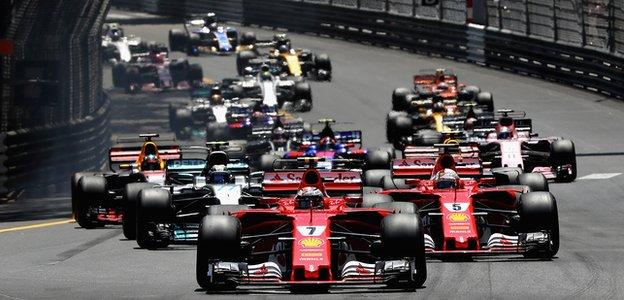
Ferrari's Raikkonen maintained his lead from pole position until he was called into the pits on lap 34
Will it affect Raikkonen?
Whether Raikkonen believes Ferrari's explanation or not remains to be seen - and he's unlikely to reveal it if he does not.
It could yet affect his season, though. His reaction after the race - clearly unhappy - did not suggest he knew that Vettel was a contractual number one even if he is. And if Raikkonen is convinced Ferrari deliberately scuppered his chances of a win in F1's most prestigious race, what will it do to his motivation?
"We are a team and if you don't believe what you have been told then it will get very complicated at some point," he said. "As a team we wanted one-two. It happened. As for myself, it could have been better but we have just finished the race and who knows?
"We'll talk about it and I guess there are some reasons for everything that happened. As a driver I can do what I want but it is not how we work as a team."
Worrying signs for Mercedes
After the race, Hamilton insisted he was "generally happy" to have salvaged six points for seventh place. "I was devastated yesterday and to come away with some points is better than nothing.," he said.
It was not a bad result in the circumstances, but in some ways Hamilton has only himself to blame for it not being better.
The car was undoubtedly difficult at Monaco - both Mercedes drivers said so - but Bottas qualified third just 0.045secs off pole.
Hamilton was 13th on the grid. Pushing for a time in a car he said felt "the most unusual in all the years I have been here", he very nearly crashed at Massenet on his first run in second qualifying, and then very nearly crashed at Casino Square on his second.
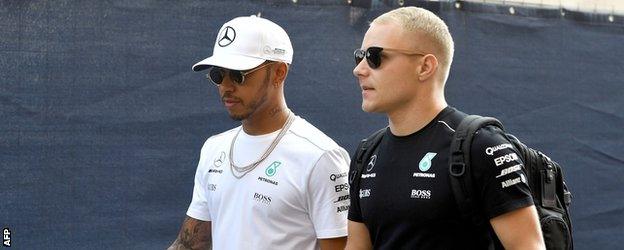
Mercedes are struggling with tyres at certain circuits
He was held up by McLaren's Stoffel Vandoorne on another lap which would have been good enough to take him through and then his final lap, which was also looking set to be good enough, was thwarted when the Belgian crashed.
Some of that was out of his control, but at the same time he broke the age-old Monaco adage that you have to get a 'banker' lap in early before pushing hard.
Had he done so, he would have made the top 10. He looked slower than Bottas for most of the weekend after setting the pace in first practice, but not by much, and he would surely have been at least fifth or sixth, possibly fourth. From there, a podium would have been a definite possibility, even if the car remained "not that great" during the race.
Meanwhile, the auguries from Monaco in general were not great for Mercedes. Two races after struggling to get the ultra-soft tyre into its working range in Russia, the same thing afflicted them in Monaco.
F1 Quiz - Did Christian Horner want to be a stunt man?
Mercedes have been struggling with this all season - sometimes the tyre is too hot, sometimes too cold. But as team boss Toto Wolff pointed out, they have not at any stage all year had both cars working the tyres as intended, whereas the Ferrari has worked in all conditions on all tyres.
No wonder, then, that Wolff said: "We are the underdogs. This is the new reality."
Is there a performance pattern emerging, too? Sochi and Monaco are both low-grip, low-abrasion tracks with a predominance of slow corners. So are the next three races - Canada in two weeks' time, then Azerbaijan and Austria.
If they hit the same problems at all those three races, Vettel could head into the British Grand Prix at Silverstone - the halfway point of the season - with a very substantial lead.
"I can't say there's a pattern," Hamilton said, pointing out it had only been two races so far. "So it is not super-clear at the moment. But we will be pushing to fully understand it. because we can't be in this position again and one more race like this and we will be much further behind."
He added: "But I like to look at the glass half-full. I did what I came to do. I like to think those points will be valuable at the end of the season."
So they may well be. But the same could equally be said of the 25 scored by Vettel.
- Published28 May 2017

- Published28 May 2017
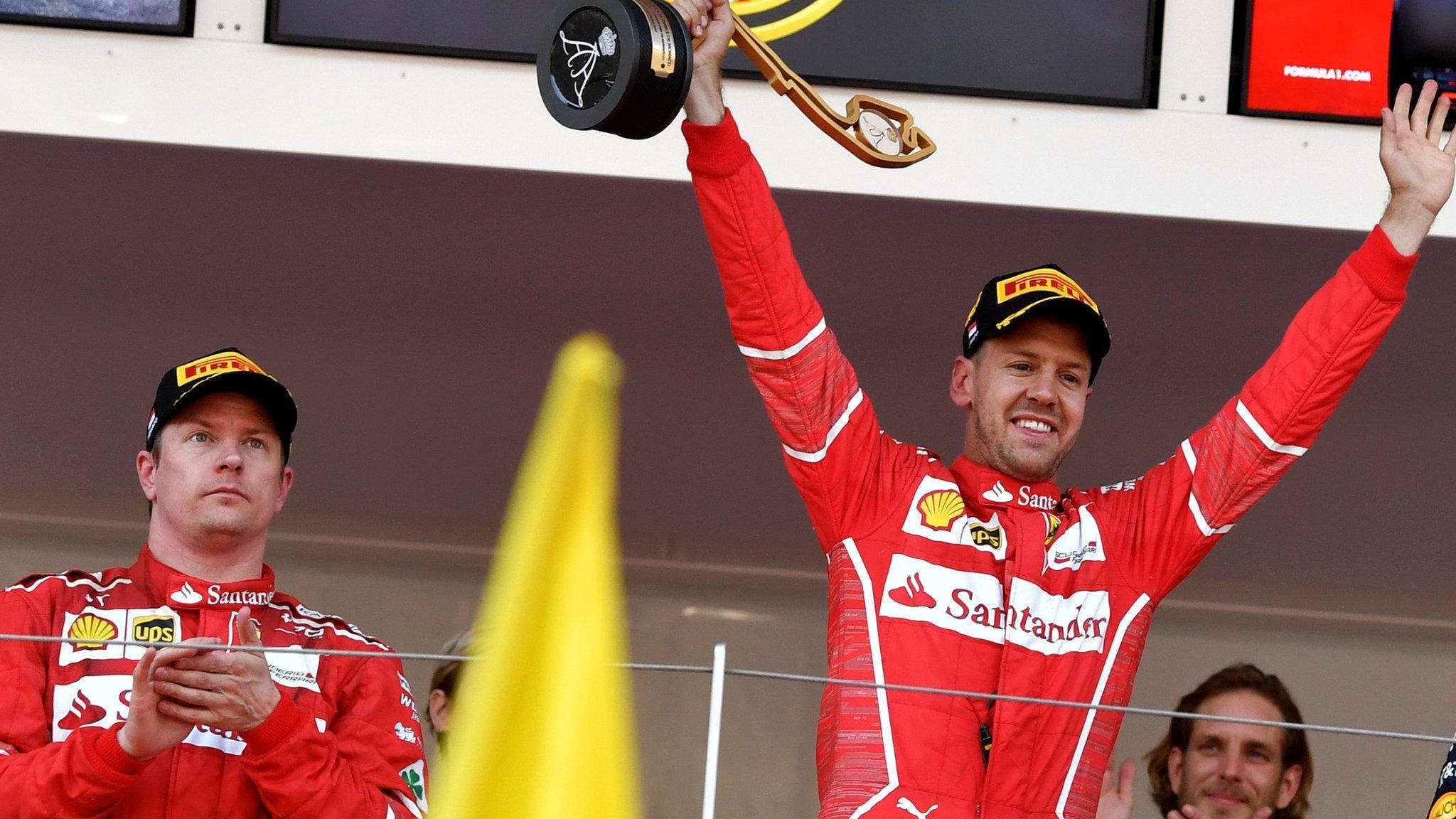
- Published28 May 2017
